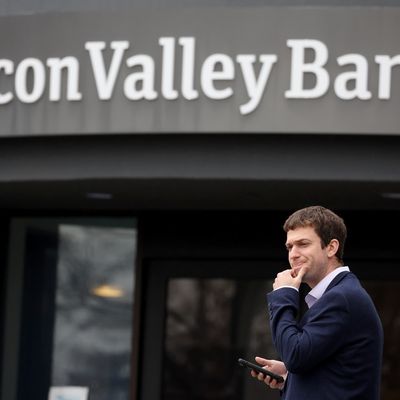
Flow Health runs a network of diagnostic labs and provides COVID testing for clients in the entertainment industry. It’s headquartered in Culver City, California, with offices around the country. It employs about a thousand people, none of whom are getting paid this week. “We just have no way,” says Alex Meshkin, Flow Health’s CEO. “It’s a big fucking mess.” He notified his employees this morning. They’re mad, and with good reason. Many are hourly workers living paycheck to paycheck. Some have threatened not to come to work or to quit. Others are just trying to figure out what the next week looks like. “You should see the messages in Slack,” Meshkin says.
It’s not that his company isn’t good for it — there’s plenty of money to double up on payroll for a period if that’s what it takes, says Meshkin. The problem is that Flow Health uses a payroll provider called Rippling, and Rippling — a San Francisco–based start-up with a multibillion-dollar valuation — is a client of Silicon Valley Bank, which, as of this morning, no longer exists.
Silicon Valley Bank is, or was, the 16th largest bank in the country, and is the first American bank of its size to fail since the global financial crisis. The backstory is complicated, but runs, crudely, like this: SVB took on a lot of new business over the last few years, as start-ups and tech companies flourished, making, or at least raising, a bunch of money, which it had to put somewhere. During this time, it purchased a lot of low-yield government-issued bonds. As interest rates rose, and as the tech industry cooled, SVB was forced to sell some of its bonds at a loss; its subsequent attempts to raise money, along with clumsy messaging around its not-yet-dire predicament, then helped contribute to a classic bank run, as founders and VCs lost their nerve and raced to pull out their deposits. With the bank unable to satisfy all the withdrawal requests, the government made its move.
According to the FDIC, insured depositors will have access to their funds on Monday, through a newly formed entity called the Deposit Insurance National Bank of Santa Clara. Uninsured depositors — who, due to SVB’s corporate and wealthy clientele, account for a large majority of its liabilities — will be provided with an “advance dividend” of unspecified size “within the next week.” At that point, the FDIC will start selling off SVB’s assets with the aim of making its former clients whole. How that will go, or how long it will take, is anyone’s guess.
None of this information is especially helpful to employees of Flow Health in Atlanta or Bayonne or Toronto, who had no way of knowing that the timely arrival of their next paycheck depended on the collective level of anxiety among Silicon Valley’s CFOs. (New York’s parent company, Vox Media, was also an SVB customer.)
Nor is it useful to Flynn Zaiger, who runs a digital agency called Online Optimism, headquartered in New Orleans. “I woke up to Slacks from employees asking why they weren’t paid,” says Zaiger, who is on the road this week. He’s got 17 employees; the plan, for now, is to just use Zelle.
In Silicon Valley and on Wall Street, the word of the day is contagion. There are worries that SVB won’t be the last bank of its type to fall. The stock market took a sharp dive on Friday, with especially deep discounts on tech-adjacent banks including First Republic, PacWest, and Signature Bank. (Crypto bank Silvergate, which had deep connections with FTX, wound down operations this week.) SVB, which had around $209 billion in assets and $175.4 billion in deposits as of December, according to the FDIC, wasn’t just a major bank, it was deeply intertwined with the tech industry in ways that will be hard, especially in receivership, to unravel. Start-ups and VCs are trying to secure short-term loans to make their own payrolls, according to The Information. The start-up slump helped bring down SVB, and there are fears that its collapse could make the situation much worse.
The situation at Rippling — which says it has switched banks and can begin issuing fresh payments as soon as Monday — offers a preview of how a crisis in Silicon Valley could escape containment in less predictable ways. Tech companies, like banks, are deeply integrated into the rest of the economy, in ways that aren’t always obvious or visible — that is until they break.






























